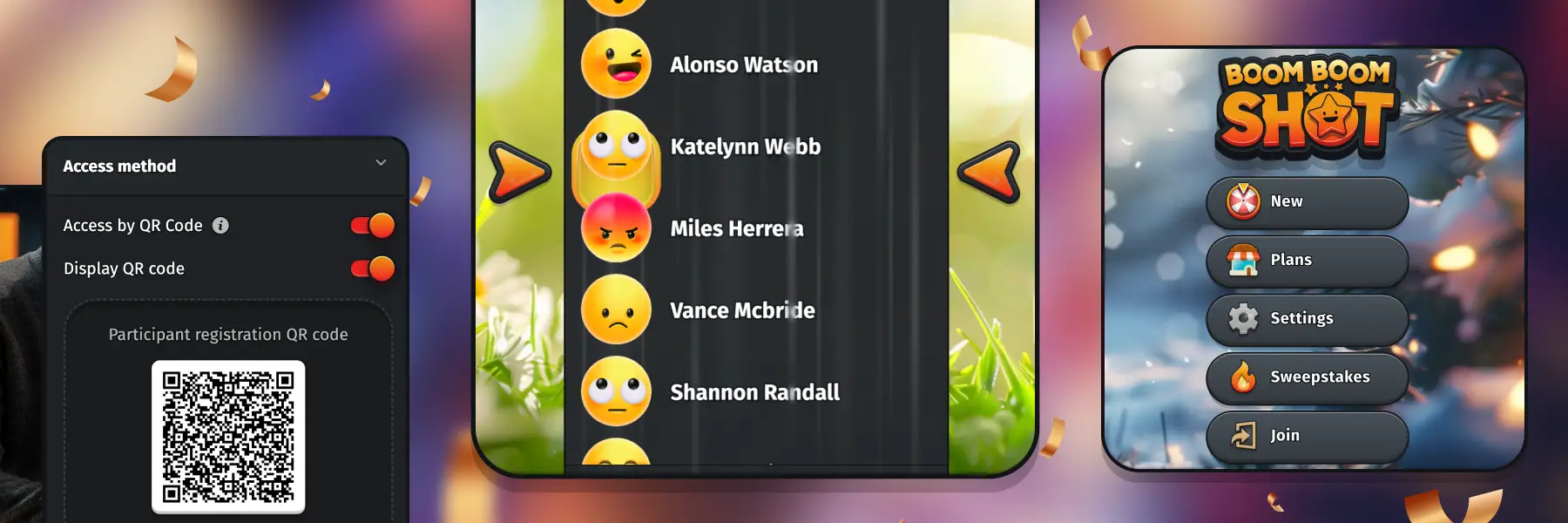Create a fully branded digital sweepstakes in less than five minutes with Boom Boom Shot. From custom forms and automated emails to live draws, prizes, and data exports, this step-by-step guide shows you how to launch a professional sweepstakes for any event in just a few clicks.
Raffle vs. Contest: What are the Differences?
Introduction
In the world of gaming, promotion, and entertainment, two terms frequently come up: the raffle and the contest. Although these terms are sometimes used interchangeably, they actually represent two distinct concepts each with their own specifics, pros, and cons.
- Raffle: Overview and Features
- Contest: Overview and Features
- Practical Applications and Usage Contexts
- Legal and Ethical Aspects
- Conclusion
Definition
- Raffle: A process where a winner is randomly chosen from a list of participants. Luck is the primary determining factor, and no skill or effort is usually required from the participants.
- Contest: A competitive event where participants compete based on specific criteria. Unlike raffles, contests often require a certain level of skill, talent, or effort, and winners are chosen based on their performances.
Origins and History of These Two Forms of Games
Raffles and contests are as old as history itself. Raffles were used in ancient times for collective decision-making or resource division. For instance, in ancient Greece, public positions were sometimes assigned by drawing lots to ensure an equitable distribution of power.
Similarly, contests have a long-standing tradition, from the ancient Olympic Games to medieval tournaments, where skills and talent were celebrated and rewarded.
Current Importance
Today, raffles and contests hold a significant place in a company’s marketing strategy, helping to attract attention, retain customers, and promote new products. They are also ubiquitous on social media, providing a quick engagement opportunity with an audience.

Raffle: Overview and Features
Definition and Functioning
A raffle is a mechanism based purely on chance, where the outcome is determined randomly, regardless of participants’ skill, talent, or effort. In most cases, entry into a raffle is free, and the only criterion to participate is often just to sign up or provide basic information.
Popular Examples
- National Lotteries: These games are state-regulated and often offer significant jackpots, drawing a large number of participants. Tickets are purchased, and winners are determined by randomly drawn numbers.
- Social Media Drawings: With the rise of social platforms, many brands hold raffles where participants can win prizes by taking certain actions, like liking a post, sharing it, or tagging friends.
Advantages
- Accessibility to a Broad Audience: Anyone can join a raffle, making it appealing to a wide audience.
- Ease of Implementation: The rules are often simple, making both participation and organization straightforward.
- Potential for Rapid Accumulation of Participants: Due to its inclusive nature, a raffle can quickly gain popularity and draw numerous participants.
Disadvantages
- Less Control Over Participant Quality: Unlike contests where participants are judged based on certain criteria, a raffle is open to everyone, which might sometimes result in multiple entries or less-engaged participants.
- Risks Associated with Legitimacy and Fraud: Without proper regulation, some raffles might be perceived as less legitimate or transparent, and there’s a risk of individuals attempting to cheat or manipulate the outcomes.

Contest: Overview and Features
Definition and Functioning
Unlike raffles, a contest is a competition based on specific evaluation criteria. Participants typically need to demonstrate a specific skill, talent, or particular effort to be eligible to win. Their participation is judged based on these criteria, and winners are chosen based on their performance or contributions.
Popular Examples
- Talent Contests: Whether in singing, dancing, music, or other artistic forms, these contests reward the best talents through performances evaluated by a jury or the public.
- Sports Competitions: From soccer to the Olympics, these contests determine winners based on their athletic performances.
- Writing or Photography Contests: These competitions aim to identify and reward creative talents. Participants submit their works, which are then judged by experts or the general public.
Advantages
- Potential to Target a Specific Audience: Contests can be designed to draw a specific type of participants based on the required skills or interests.
- Acknowledges Skills or Talents: Unlike raffles, contests recognize and reward individual merit.
- Chance to Obtain Quality Contributions: In creative or innovative contests, organizers might receive high-quality works or ideas that can be used for promotional or commercial purposes.
Disadvantages
- More Complex Implementation: Organizing a contest often demands more planning and resources, especially to establish clear evaluation criteria and ensure a fair judging process.
- Potentially Less Inclusive: Skill or talent requirements might exclude certain individuals who would like to participate.
- Risk of Subjectivity in Evaluation: Even with clear criteria, there might be variations in how performances are judged, especially if based on personal preferences or subjective opinions.
Practical Applications and Usage Contexts
When designing a promotional campaign or an event, the choice between a raffle and a contest largely depends on the targeted goals and audience. Here are some guidelines to determine the best option:
When to Use a Raffle?
- Product Launch: If the aim is to create buzz around a new product, a raffle can encourage people to sign up to win a sample or a first edition. It’s a fast way to gain visibility.
- Quick Engagement: If a brand wants to rapidly boost its social media engagement, a raffle, which often just requires liking, sharing, or commenting, is ideal.
- Information Gathering: For building a client database or conducting market research, a raffle can entice people to provide their details or answer a survey in exchange for a chance to win.
When Is a Contest More Suitable?
- Talent Search: If an organization is looking to discover new talents, whether artists, writers, or designers, a contest is the way to go.
- Creative Promotions: When the goal is to obtain original content, like photos, videos, or testimonials, a contest can motivate participants to give their best to stand out.
- Strengthening Community Engagement: Contests can help build or strengthen a community around a brand or specific interest, fostering collaboration, healthy competition, and idea sharing.
Elements to Consider When Choosing
- Campaign Duration: A raffle can be set up and concluded swiftly, while a contest might need more time for submissions, evaluation, and winner selection.
- Budget: Holding a contest might be more resource-intensive, especially if each entry requires manual evaluation.
- Retention: While a raffle can generate immediate interest, a contest might have a longer-lasting impact, creating memorable experiences for participants.

Legality and Ethics
Whether it’s a raffle or contest, it’s crucial to ensure the event is organized legally and ethically to maintain participant trust and avoid potential legal repercussions.
Legal Aspects to Consider
- Official Rules: Every raffle or contest should come with clearly defined rules, stating participation conditions, eligibility criteria, duration, prizes, and the winner selection process.
- Data Protection: With participant data collection (name, email, etc.), it’s vital to adhere to privacy regulations, like GDPR in Europe.
- Consent: Participants should be informed about the conditions and voluntarily agree to them. Any subsequent changes to the rules can lead to legal complications.
Ethical Concerns
- Transparency: Organizers should ensure a transparent process, especially in winner selection. This is vital to maintain public trust.
- Non-discrimination: Contests should be open to all and not favor or discriminate against any group based on age, gender, race, or religion.
- Honest Advertising: Benefits and prizes associated with the raffle or contest should be clearly presented without exaggeration or misrepresentation.
Consequences of Non-compliance
- Legal Sanctions: Organizers might face fines or lawsuits in case of violations of applicable laws.
- Loss of Trust: A brand or organization’s reputation can be severely impacted if participants feel they were deceived or treated unfairly.
- Financial Repercussions: Beyond legal sanctions, negative press or word-of-mouth can impact sales or future participation in similar events.
👉 Want to learn more about ensuring fairness in an online raffle? Head to this article.
Conclusion: Raffle or Contest, Which to Choose?
The choice between a raffle and a contest largely depends on specific goals, available resources, and the target audience nature. Each method has distinct pros and cons, which should be carefully weighed before making a decision.
Recap of Key Points
- Raffle: Based on chance, it’s typically easy to set up and can quickly draw a large audience. However, it offers less control over participation quality and might raise legitimacy concerns.
- Contest: Based on merit, it allows for identifying and valuing specific talents or skills. While more complex to organize, it can lead to deeper and more lasting engagement from participants.
Final Considerations
- Campaign Objectives: If the goal is to achieve broad visibility in a short time, a raffle might be preferable. If, on the other hand, the aim is to deeply engage a community or gather quality contributions, a contest would be more fitting.
- Available Resources: Organizing a contest usually demands more time, effort, and budget than setting up a simple raffle.
- Brand Reputation: It’s crucial to maintain participant trust by ensuring transparency and ethics, whether it’s a raffle or a contest.
Final Thoughts
In the end, whether you opt for a raffle or a contest, the most important element is to guarantee a positive and enriching experience for all participants. By staying transparent, fair, and attuned to your audience’s expectations, you can maximize your event’s impact while bolstering your brand image.
👉 Looking to organize a transparent and fair raffle? The online raffle tool Boom Boom Shot is for you!




